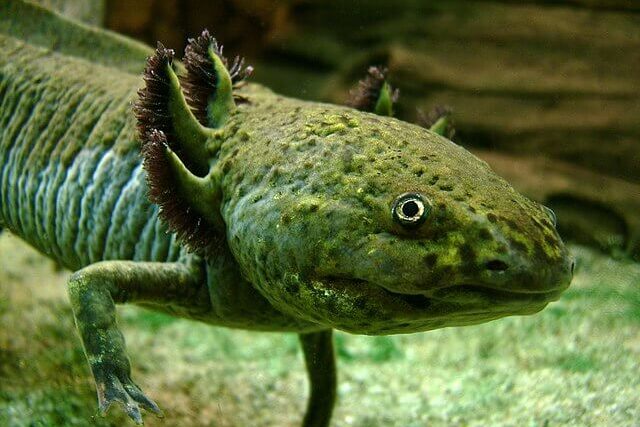
Mexico’s National Autonomous University ecologists have launched the Adoptaxolotl campaign to support conservation efforts for the endangered axolotls, a unique fish-like salamander native to Mexico.
The initiative invites individuals to contribute as little as 600 pesos (approximately $35) for a virtual adoption of an axolotl, providing live updates on the creature’s well-being. Donors can also opt for a virtual dinner for the axolotls, which are popular pets in the United States.
In the primary habitat of Mexican axolotls, population density has witnessed a staggering 99.5% decline in under two decades. The 2021 Adoptaxolotl campaign raised over 450,000 pesos ($26,300), supporting experimental captive-breeding programs and habitat restoration in the ancient Aztec canals of Xochimilco, a southern borough of Mexico City.
Despite the campaign’s success, resources for comprehensive research remain insufficient, according to Alejandro Calzada, an ecologist surveying lesser-known axolotl species for the government’s environment department.
“We lack big monitoring of all the streams in Mexico City,” let alone the whole country, said Calzada, who leads a team of nine researchers. “For this large area it is not enough.”
While the axolotl has gained popularity, nearly all 18 Mexican axolotl species are critically endangered due to water pollution, amphibian fungus, and non-native rainbow trout.
Previously, scientists could find an average of 6,000 axolotls per square kilometre in Mexico; however, the latest census from the National Autonomous University indicates a drastic decline, with only 36 remaining. A recent international study suggests that fewer than 1,000 Mexican axolotls exist in the wild.
Luis Zambrano González, a scientist at the university leading the campaign, expressed the intention to conduct a new census in March, the first since 2014.
“There is no more time for Xochimilco,” said Zambrano. “The invasion” of pollution is very strong: soccer fields, floating dens. It is very sad.”
The lack of data on the number and distribution of axolotl species makes it challenging to determine their conservation status and allocate available resources effectively.
“What I know is that we have to work urgently,” Calzada said.
Axolotls have become a cultural icon in Mexico, admired for their distinctive appearance and remarkable ability to regrow limbs. Their regenerative abilities have attracted scientific interest globally, with researchers exploring their potential applications in tissue repair and cancer recovery.
Government conservation efforts have primarily focused on the Mexican axolotl in Xochimilco. Still, other species, found in various regions from the valley of Mexico to the northern Sonora desert, face threats from urbanisation, water pollution, and invasive species like rainbow trout.
The canals in Mexico City are experiencing water quality degradation due to urbanisation, while rainbow trout from farms in the lakes around the capital pose a threat by displacing axolotls and consuming their food. Additionally, chytrid fungus, a skin-eating disease causing amphibian die-offs globally, is increasingly affecting axolotls in Mexico.
Despite academic reliance on donations and volunteer support, the Mexican government has approved an 11% funding cut for its environment department, exacerbating challenges in addressing the conservation needs of the axolotls. Over its six-year term, the administration of President Andrés Manuel López Obrador will have allocated 35% less funding to the country’s environment department than its predecessor, according to an analysis of Mexico’s 2024 budget.
——————————————————————————
At Natural World Fund, we are passionate about stopping the decline in our wildlife.
The decline in our wildlife is shocking and frightening. Without much more support, many of the animals we know and love will continue in their decline towards extinction.
When you help to restore a patch of degraded land through rewilding to forests, meadows, or wetlands, you have a massive impact on the biodiversity at a local level. You give animals a home and food that they otherwise would not have had, and it has a positive snowball effect on the food chain.
We are convinced that this is much better for the UK than growing lots of fast-growing coniferous trees, solely to remove carbon, that don’t actually help our animals to thrive.
This is why we stand for restoring nature in the UK through responsible rewilding. For us, it is the right thing to do. Let’s do what’s right for nature!
Donate today at https://naturalworldfund.com/ and join in the solution!

